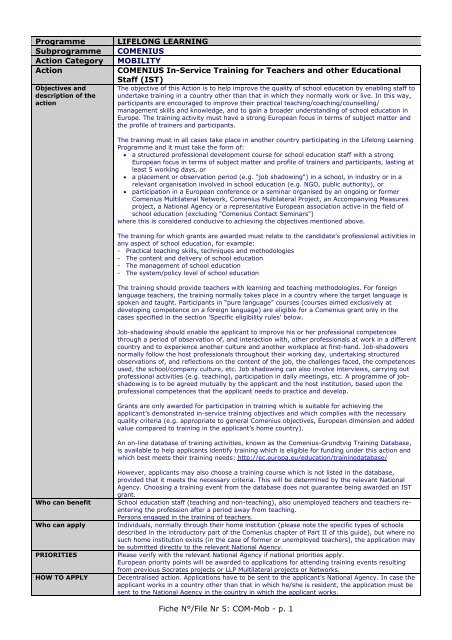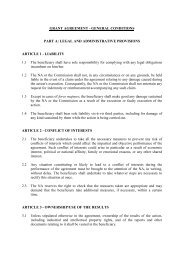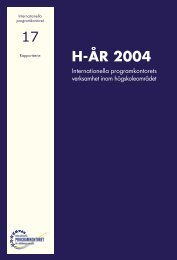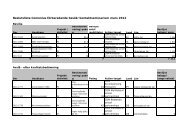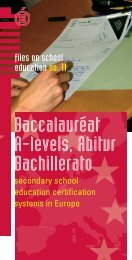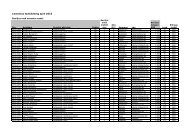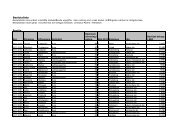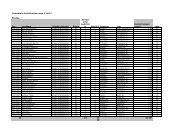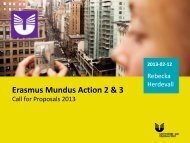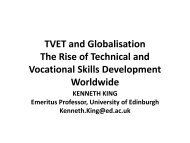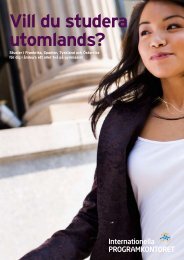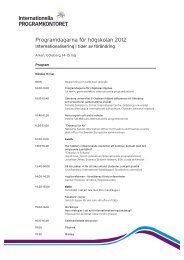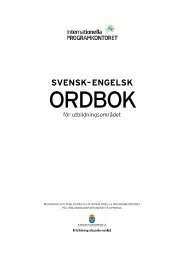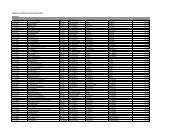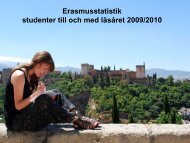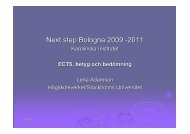COMENIUS In-Service Training
COMENIUS In-Service Training
COMENIUS In-Service Training
Create successful ePaper yourself
Turn your PDF publications into a flip-book with our unique Google optimized e-Paper software.
Programme<br />
Subprogramme<br />
Action Category<br />
Action<br />
Objectives and<br />
description of the<br />
action<br />
LIFELONG LEARNING<br />
<strong>COMENIUS</strong><br />
MOBILITY<br />
<strong>COMENIUS</strong> <strong>In</strong>-<strong>Service</strong> <strong>Training</strong> for Teachers and other Educational<br />
Staff (IST)<br />
The objective of this Action is to help improve the quality of school education by enabling staff to<br />
undertake training in a country other than that in which they normally work or live. <strong>In</strong> this way,<br />
participants are encouraged to improve their practical teaching/coaching/counselling/<br />
management skills and knowledge, and to gain a broader understanding of school education in<br />
Europe. The training activity must have a strong European focus in terms of subject matter and<br />
the profile of trainers and participants.<br />
The training must in all cases take place in another country participating in the Lifelong Learning<br />
Programme and it must take the form of:<br />
• a structured professional development course for school education staff with a strong<br />
European focus in terms of subject matter and profile of trainers and participants, lasting at<br />
least 5 working days, or<br />
• a placement or observation period (e.g. "job shadowing") in a school, in industry or in a<br />
relevant organisation involved in school education (e.g. NGO, public authority), or<br />
• participation in a European conference or a seminar organised by an ongoing or former<br />
Comenius Multilateral Network, Comenius Multilateral Project, an Accompanying Measures<br />
project, a National Agency or a representative European association active in the field of<br />
school education (excluding "Comenius Contact Seminars")<br />
where this is considered conducive to achieving the objectives mentioned above.<br />
The training for which grants are awarded must relate to the candidate’s professional activities in<br />
any aspect of school education, for example:<br />
- Practical teaching skills, techniques and methodologies<br />
- The content and delivery of school education<br />
- The management of school education<br />
- The system/policy level of school education<br />
The training should provide teachers with learning and teaching methodologies. For foreign<br />
language teachers, the training normally takes place in a country where the target language is<br />
spoken and taught. Participants in “pure language” courses (courses aimed exclusively at<br />
developing competence on a foreign language) are eligible for a Comenius grant only in the<br />
cases specified in the section 'Specific eligibility rules' below.<br />
Job-shadowing should enable the applicant to improve his or her professional competences<br />
through a period of observation of, and interaction with, other professionals at work in a different<br />
country and to experience another culture and another workplace at first-hand. Job-shadowers<br />
normally follow the host professionals throughout their working day, undertaking structured<br />
observations of, and reflections on the content of the job, the challenges faced, the competences<br />
used, the school/company culture, etc. Job shadowing can also involve interviews, carrying out<br />
professional activities (e.g. teaching), participation in daily meetings, etc. A programme of jobshadowing<br />
is to be agreed mutually by the applicant and the host institution, based upon the<br />
professional competences that the applicant needs to practice and develop.<br />
Grants are only awarded for participation in training which is suitable for achieving the<br />
applicant’s demonstrated in-service training objectives and which complies with the necessary<br />
quality criteria (e.g. appropriate to general Comenius objectives, European dimension and added<br />
value compared to training in the applicant’s home country).<br />
An on-line database of training activities, known as the Comenius-Grundtvig <strong>Training</strong> Database,<br />
is available to help applicants identify training which is eligible for funding under this action and<br />
which best meets their training needs: http://ec.europa.eu/education/trainingdatabase/<br />
Who can benefit<br />
Who can apply<br />
PRIORITIES<br />
HOW TO APPLY<br />
However, applicants may also choose a training course which is not listed in the database,<br />
provided that it meets the necessary criteria. This will be determined by the relevant National<br />
Agency. Choosing a training event from the database does not guarantee being awarded an IST<br />
grant.<br />
School education staff (teaching and non-teaching), also unemployed teachers and teachers reentering<br />
the profession after a period away from teaching.<br />
Persons engaged in the training of teachers.<br />
<strong>In</strong>dividuals, normally through their home institution (please note the specific types of schools<br />
described in the introductory part of the Comenius chapter of Part II of this guide), but where no<br />
such home institution exists (in the case of former or unemployed teachers), the application may<br />
be submitted directly to the relevant National Agency.<br />
Please verify with the relevant National Agency if national priorities apply.<br />
European priority points will be awarded to applications for attending training events resulting<br />
from previous Socrates projects or LLP Multilateral projects or Networks.<br />
Decentralised action. Applications have to be sent to the applicant's National Agency. <strong>In</strong> case the<br />
applicant works in a country other than that in which he/she is resident, the application must be<br />
sent to the National Agency in the country in which the applicant works.<br />
Fiche N°/File Nr 5: COM-Mob - p. 1
Please consult the relevant Agency website for further information.<br />
Selection Procedure: NA1<br />
Application<br />
Deadline(s):<br />
16 January 2013<br />
30 April 2013<br />
17 September 2013<br />
Duration<br />
Minimum Duration: 1 day<br />
Maximum Duration: 6 weeks<br />
Comment on<br />
Round 1: for 16/01/2013 training activities must start on or after 1 May 2013<br />
Duration:<br />
Round 2: for 30/04/2013 training activities must start on or after 1 September 2013<br />
Round 3: for 17/09/2013 training activities must start on or after 1 January 2014<br />
<strong>Training</strong> events must start by 30 April 2014 at the latest.<br />
The individual National Agencies may also set end dates for the above training periods. Please<br />
consult your National Agency's website for information.<br />
FINANCIAL PROVISIONS<br />
Please consult Part I of this Guide, Chapter 4 Financial Provisions for more information.<br />
Applicable Grant Table 1a<br />
Table(s):<br />
Maximum Grant €: Not applicable<br />
Comment on<br />
The main grant is for travel and subsistence.<br />
Funding:<br />
Course, conference or seminar fees: A contribution may be granted on the basis of real costs.<br />
Please consult your National Agency's website for information on the maximum amount.<br />
Linguistic preparation: A contribution may be granted on the basis of a lump sum. Please consult<br />
your National Agency's website for information on the amount (Note: a grant for linguistic<br />
preparation is not allowable where the training itself is oriented exclusively or predominantly<br />
towards the improvement of language skills.)<br />
EVALUATION AND SELECTION PROCEDURES<br />
Please consult Part I of this Guide, chapter WHAT IS THE LIFECYCLE OF A PROJECT for further information about the<br />
evaluation and selection procedures<br />
Eligibility Criteria<br />
General eligibility rules:<br />
The general eligibility criteria for applications in the LLP Programme are outlined in Part I of this Guide, Chapter 3.<br />
Participating countries: please refer to Part I of this Guide, section "Which countries participate in the Programme?"<br />
Specific eligibility<br />
rules:<br />
1. <strong>In</strong>dividual applicants must be either:<br />
- a national of a country participating in the Lifelong Learning Programme;<br />
- a national of other countries employed or living in a participating country, under the<br />
conditions fixed by each of the participating countries, taking into account the nature of the<br />
programme (please refer to the relevant National Agency website).<br />
2. The course/conference organiser must come from and be located in a country participating in<br />
the LLP.<br />
3. The IST event applied for takes place in a country participating in the LLP in which the<br />
applicant is not a resident, and which is different from the one where the applicant works.<br />
4. School education staff categories eligible for a Comenius IST grant:<br />
- Teachers (including those in pre-school and vocational education) and the trainers of such<br />
teachers<br />
- Head teachers and school managerial/administrative staff<br />
- Staff involved in intercultural education or working with children of migrant workers and<br />
travellers<br />
- Staff working with pupils with special education needs<br />
- Staff working with pupils at risk, such as mediators and street educators<br />
- Counsellors or careers advisors<br />
- <strong>In</strong>spectors<br />
- Former and unemployed teachers re-entering the profession after a period away from<br />
teaching<br />
- Other education staff at the discretion of national authorities<br />
Fiche N°/File Nr 5: COM-Mob - p. 2
5. The following education staff members are eligible for a grant for "pure language" training:<br />
- A school teacher requesting training in a less widely used and less taught language<br />
- A teacher teaching another subject in school through the medium of a foreign language<br />
(CLIL)<br />
- A school teacher retraining as a foreign language teacher<br />
- A primary or pre-primary teacher who is (or will be) required to teach foreign languages<br />
- School staff participating in a Comenius Partnership and requesting training in a Partnership<br />
language<br />
- <strong>In</strong>dividual Pupil Mobility mentors and contact teachers requesting training in a language<br />
necessary for implementing the pupil mobilities<br />
For the participation of individuals working in specific types of schools, please refer to the<br />
introductory part of the Comenius Chapter in Part II of this Guide.<br />
Please verify with the National Agency to which you will apply if any additional national<br />
requirements exist.<br />
Minimum number of<br />
Countries:<br />
Minimum number of<br />
Partners:<br />
Comment on<br />
participants:<br />
Award criteria<br />
Not applicable<br />
Not applicable<br />
1. European added value<br />
The training activity abroad has a greater potential value than similar training in the applicant's<br />
home country and it is clearly demonstrated that the applicant will benefit from this experience<br />
in terms of professional and personal development. Use of Europass Mobility is recommended.<br />
2. Content and duration<br />
The content of the training activity is related to the applicant's professional activity and<br />
compatible with the objectives of the Comenius programme. If the activity is not related to the<br />
applicant's professional activity or is not compatible with the objectives of the Comenius<br />
programme, the application will be rejected.<br />
The programme for the mobility action is clear and reasonable; its duration is realistic and<br />
coherent with the foreseen activities. The applicant provides a convincing explanation of his/her<br />
linguistic capacity to benefit from the training and of the preparatory activities that he/she<br />
intends to undertake.<br />
3. Impact and relevance<br />
There is a clear match between the training selected and the applicant's training needs. It can be<br />
expected to have a positive impact on his/her personal and professional development and his/her<br />
institution.<br />
4. Dissemination of results<br />
The dissemination activities are relevant and well defined. The dissemination plan clearly<br />
demonstrates the applicant's approach to communicate effectively the results of the foreseen<br />
training activity, so as to maximise its impact on the applicant’s own institution.<br />
CONTRACTING PROCEDURES<br />
Probable sending date of pre-information on the results of the selection process<br />
Probable sending date of agreement to the beneficiaries<br />
Probable starting date of the action<br />
See NA website<br />
See NA website<br />
Not applicable<br />
Fiche N°/File Nr 5: COM-Mob - p. 3


